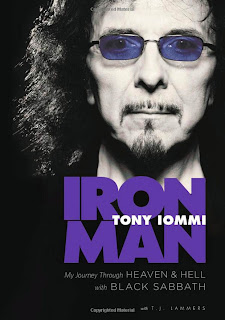Many people beat me to it, including my friend and co-worker Justin Norton, who reviewed the book for the Invisible Oranges website.
I also made the mistake of actually reading Justin's review, which sealed the deal that I would never write my own, because I agreed with 95 percent of his review and mine would be a copy.
So I asked Justin if I could just re-post his (lazy, I know), so I am doing so. But first let me say that I enjoyed the book and learned an awful lot about Iommi. The story about how he crafted the prosthetic fingertips after his factory injury is fascinating. In fact the detail in which he describes what he has to do to this day to keep his fingers in shape for playing is really amazing.
Overall the book is entertaining but a little dry. The stories of how they used to haze Bill Ward are pretty awesome. The Born Again era is well-documented, but the reunion with Dio is almost an afterthought despite the great success of those last few years.
Anyway, if you dig Sabbath, get the book. Oh and be ready to want to break out your old Sabbath LPs and really dig into them. I was inspired to do so and now feel that Sabbath Bloody Sabbath is my favorite Ozzy-era album by far.
Here is Justin's review, also posted at Invisible Oranges. Go there to read the comments - they are interesting.
Oh, and Thanks Justin for letting me steal your work.
-------------------------------
Iron Man: My Journey Through Heaven and Hell With Black Sabbath By Tony Iommi (with T.J. Lammers)
“My role was to come up with the music, with the riffs,” Tony Iommi writes early on in his memoir Iron Man: My Journey Through Heaven And Hell With Black Sabbath. “That probably stopped the others from writing music. If I didn’t come up with anything, we wouldn’t do anything.” Iommi says it in such a deadpan voice that you’d think he was talking about a day in a Birmingham plant rather than creating a genre of music that’s been around for nearly a half-century.
Considering how circumspect and low-key Iommi has been despite his achievements, it’s not a surprise that writing the building blocks of heavy metal seems like another day at work. Iron Man, co-written with T.J. Lammers, does a good job of telling Iommi’s story from Birmingham troublemaker and novice gangbanger to rock legend. Iommi’s bandmate Ozzy Osbourne has long been over-covered in print and on television; in the past two years there’s been an Ozzy autobiography, a book of humorous medical advice and a documentary helmed by his son, Jack. During Ozzy’s peak popularity in the early ’00s there were enough books on the Osbournes to fill a small shelf. Part of this is unsurprising; Ozzy’s antics and his public persona beg for stories and tabloid coverage. Meanwhile Iommi – the man who created the musical universe that propelled Ozzy to stardom – spoke through music. Who needs words when you wrote the riff for “Paranoid”?
Nonetheless, there’s been an unrelenting curiosity about Iommi’s past because time has proven him to be the cornerstone of metal. While Ozzy courts television cameras, Iommi hides behind sunglasses and often painfully generic interviews. Iron Man does a good job of answering questions. Iommi takes us back to his earliest years, when he played with also-rans like The Rockin’ Chevrolets and famously crafted part of a finger after an accident to continue playing guitar, all the way to recent passing of Ronnie James Dio.
Iommi found his muse with Sabbath; he quickly took to the road, and never stopped. The tour stories are hilarious and often horrifying; how Ozzy showed up for an early tour with just one shirt and a pair of jeans; how Iommi and one-time manager Patrick Meehan thought a wasted groupie was dead and considered throwing her off a balcony before she woke up, and how drummer Bill Ward was nearly killed when he was set on fire as a joke.
There are a number of interesting detours, including Iommi’s revelation that he experimented with astral projection but today can’t “leave his body”. Along the way there are worldwide travels; countless lines of cocaine – they really were snowblind – and musical partnerships with unlikely collaborators like Body Count’s Ernie C. Iron Man offers insights into many relationships, including Iommi’s close friendship with Led Zeppelin drummer John Bonham. Iommi’s relationship with Lita Ford gets a bit of a brush off; perhaps he views it as insignificant in retrospect.
There are no huge revelations or exposés in Iron Man, and that’s what makes it a strong record of Iommi’s life. Despite fame, riches and influence, Iommi never views himself as more than a talented and determined English guy who wanted to make music. Iron Man is a story about the power of creativity paired with drive and, ultimately, about a life well-lived.
By Justin M. Norton
PS - Justin turned me on to the band Ghost and I will be reviewing their tremendous new album soon. And no, I won't be reading Justin's first!!!!
















